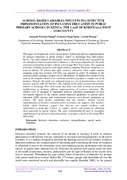School-based variables influencing effective implementation of inclusive education in public primary schools in Kenya: the case of Kirinyaga west sub-county

View/
Date
2017-09Author
Maingi, Atanasia Wambui
Njoka, Johannes Njagi
Murage, Josiah
Metadata
Show full item recordAbstract
This paper investigates the school-based factors influencing effective implementation of inclusive education in public primary school in Kirinyaga West Sub-County, Kenya. The study adopted the descriptive survey research design and was guided by the self-efficacy theory propounded by Bandura’s. The target population for the study consisted of all public primary schools in Kirinyaga West Sub-County. The sampling procedure included, purposive and simple random sampling. Purposive sampling was used to identify 10 schools that offer inclusive education while simple random sampling using Gay formula (10-20%) was applied to select 10 students in the selected schools yielding a sample size of 100 students. In addition five teachers from each of the sampled schools were randomly selected to produce a sample size of 50 teachers. Data for this study was collected using two sets of questionnaires; one for learners and the other for teachers. The findings of the study revealed that primary schools in Kirinyaga West Sub-County had done very little in terms of structural modifications to facilitate effective implementation of inclusive education. The schools were ill equipped to implement inclusive education programmes in their curriculum, majority of the schools lacked admission guidelines on special needs education (SNE) learners and instructional resources were grossly inadequate in schools. The study further established that the teachers’ attitude toward implementation of inclusive education policy in schools was negative. The teachers beliefs about inclusion suggest that they do not regard students with impairments as being able to learn in regular classes and preferred educating them separately in special schools. The study recommended the need to strengthen implementation of inclusive education policies in primary schools in Kirinyaga West Sub-county.